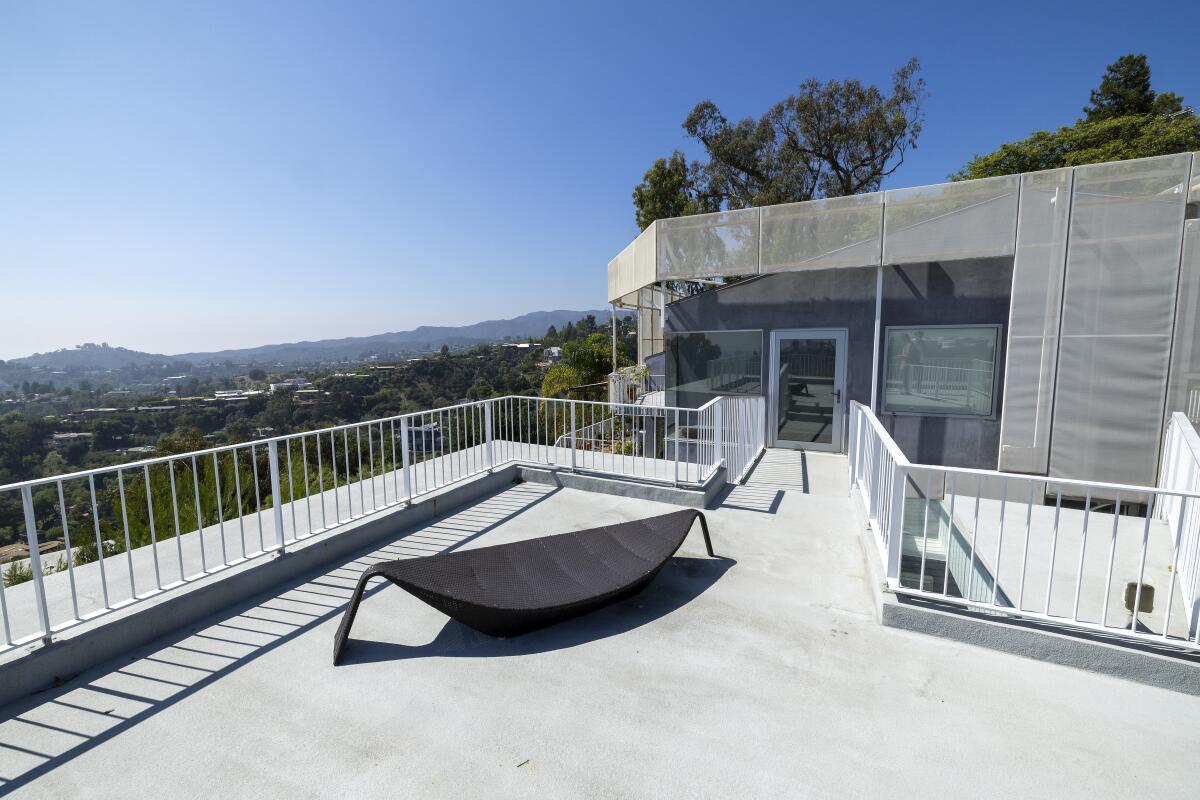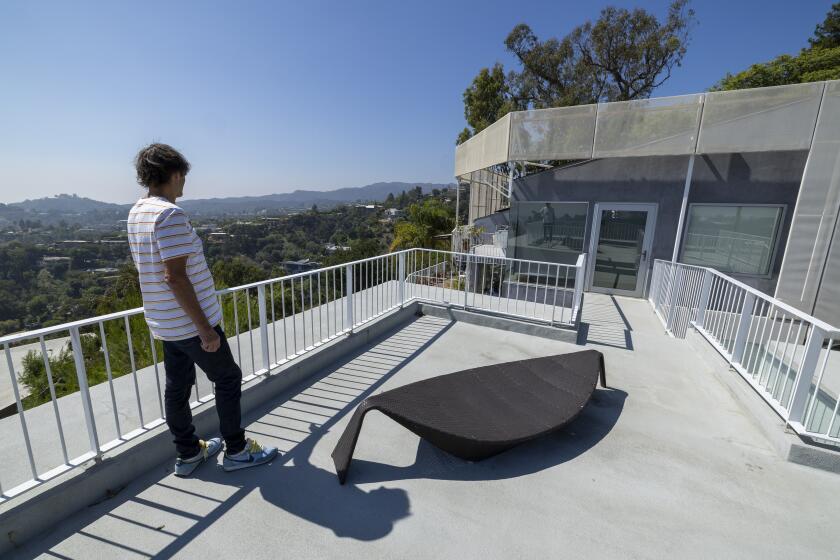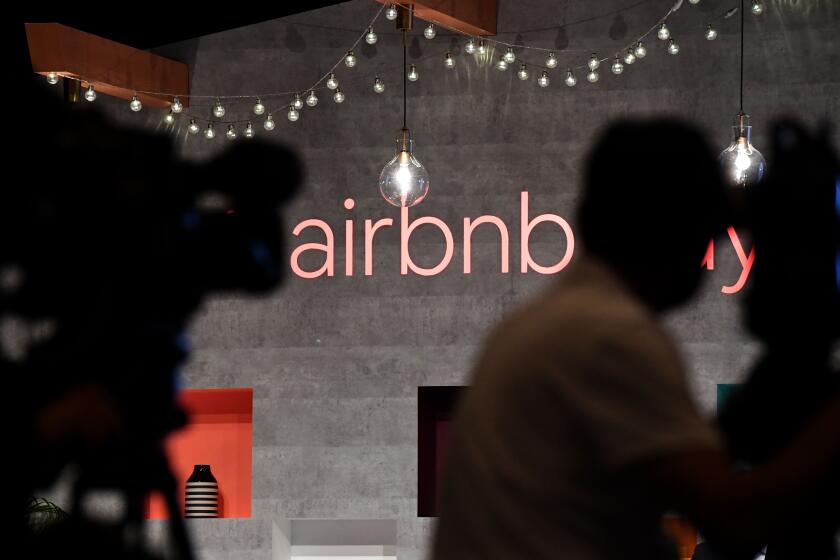How exactly did the Airbnb ‘tenant from hell’ get away with living rent-free for 540 days?

- Share via
The city of Los Angeles has gone to great lengths to protect tenants, one of many strategies in the ongoing effort to combat the housing crisis.
But those strong protections have enabled an Airbnb guest, Elizabeth Hirschhorn, to stay in a Brentwood guesthouse rent-free for the last 547 days, saying she owed nothing because the unit did not have an occupancy permit and demanding $100,000 in relocation fees to leave.
So far, the homeowner, Sascha Jovanovic, has been unable to convince a judge or the city that she should be evicted.
What started as a cordial six-month stay for $20,793 has devolved into a bitter court battle and, since The Times reported it last week, a story making international headlines. Hirschhorn and Jovanovic are suing each other while living on the same property, and both claim the law is on their side.
It’s reportedly not the first legal dispute Hirschhorn, a writer who graduated from Harvard University, has been involved in over a rental she lived in. As reported in the Daily Mail and the San Francisco Chronicle, she rented a two-bedroom cottage in Oakland in 2019 but didn’t pay the rent for more than a year, citing COVID-19 regulations and health concerns as her reason for staying for free, according to lawsuits filed against each other by the landlord and Hirschhorn.
The cases were settled in July 2021 with undisclosed terms — just a few months before she moved into the Brentwood guesthouse where she still lives.
Jovanovic is suing Hirschhorn for damages to recoup around $58,000 in unpaid rent, and Hirschhorn is countersuing to get back the money she paid in the first six months. Jovanovic also filed an unlawful detainer suit to evict Hirschhorn that was dismissed by the judge, and he’s currently appealing the decision.
L.A.’s rental market is already wrought with confusion and disputes, but the Hirschhorn-Jovanovic conflict is the perfect storm of ambiguity, with both sides citing laws that protect them from the other.
From Jovanovic’s perspective, the context surrounding the tenancy couldn’t have been worse.
Last year, an Airbnb guest at a luxury studio in Brentwood refused to check out after her scheduled stay ended. She hasn’t paid rent in more than 500 days.
The lease started on Airbnb, but he allowed her to stay an extra month off the platform, so he wasn’t sure whether to turn to the company or the city for help; it took place during the pandemic in a time with expanded tenant protections; and it was in L.A., a city that has bolstered tenant protections regularly over the last few years.
Other factors add to the predicament: The original stay of six months was long enough to establish tenant rights; the property is supposedly subject to rent control, even though rent control maps don’t show it; and he did not get proper permits.
Subscribers get early access to this story
We’re offering L.A. Times subscribers first access to our best journalism. Thank you for your support.
Here’s a look at the laws that have helped Hirschhorn occupy an illegal Airbnb for the last year and a half.
Airbnb
Airbnb, the San Francisco-based rental platform, has taken L.A.’s rental market by storm, with thousands of listings — many of them illegal — popping up over the last decade.
The city has attempted to regulate the platform, but plenty of confusion remains, especially when tenants stay in Airbnb rentals long enough to establish residency.
As Airbnb lays the foundation for long-term rentals, its own website warns hosts about accepting leases for longer than a month.
“In most states and localities in the United States, guests who stay in a home or apartment for one month or longer—the exact number of days depends on jurisdiction—may establish rights as a tenant,” the site says. “Generally, this means that local tenancy laws could protect them, and you may not be able to remove them from your property without proceeding through required eviction processes in court.”
The site says that in California, New York and Illinois, a residential tenancy could be created after 30 consecutive days of occupancy. The site suggests that hosts should have guests sign a rental agreement for long-term stays, and if a host needs to evict a guest, they should contact an attorney or their local courts to learn about local eviction laws.
As the city tries to crack down on short-term rentals, profits for Airbnb hosts are rising — whether their listings are legal or not.
Hirschhorn originally rented the unit for six months. In Jovanovic’s case, beause he agreed to extend Hirschhorn’s stay off the platform, Airbnb said it was no longer involved. And there’s no clear way for him to get help from the company.
“Airbnb’s ambiguity contributes to the problem,” said Harold Greenberg, an attorney who primarily represents landlords in landlord-tenant disputes.
Joseph Tobener, an attorney specializing in tenant law at Tobener Ravenscroft, said Airbnb has nothing to do with it.
“Airbnb is legal fiction,” said Tobener, who has sued Airbnb hosts for illegally kicking out guests in violation of local rent control. “This is a tenancy. Hosted on Airbnb or not, it doesn’t matter. Renting is renting, whether it’s for one day or a year. You still have to follow the rules.”
COVID-19 protections
When the pandemic ravaged L.A., leaving many tenants without a steady stream of income and thus unable to pay rent, the city rushed to pass emergency tenant protections to keep landlords from evicting tenants and potentially adding to L.A.’s housing crisis.
The protections were a success, helping many tenants stay in their homes, and they were regarded as some of the strongest in the nation. They disallowed rent hikes for most tenants, offered rent relief and required landlords to apply for the COVID-19 rent relief program before going through the court system to evict a tenant for not paying rent.
In April 2022, Pedro Gonzalez, a housing investigator for the L.A. Housing Department, sent Jovanovic an email saying that while the COVID-19 local emergency period is in place, landlords cannot evict someone without cause. He added that the department wasn’t accepting applications for such evictions until the emergency period was over.
The Housing Department declined to comment on the issue because it’s involved in a legal proceeding.
Jovanovic argued that Hirschhorn not paying rent was a cause, but he made a critical error: He had never obtained an occupancy permit for the guesthouse. So Hirschhorn’s lawsuit alleges she can’t owe rent on a unit that’s not even approved for occupancy.
In a statement, Hirschhorn’s attorney, Colin Walshok, called the dwelling “an illegal bootleg unit” because it didn’t have a permit.
Hirschhorn’s lawsuit against Jovanovic referenced Gonzalez’s email, saying she was protected under the COVID-19 eviction moratorium.
Sign up for This Evening's Big Stories
Catch up on the day with the 7 biggest L.A. Times stories in your inbox every weekday evening.
You may occasionally receive promotional content from the Los Angeles Times.
It accuses Jovanovic of violating the Los Angeles County COVID-19 Tenant Protections Resolution by failing to provide housing services, failing to perform repairs and trying to intimidate Hirschhorn into leaving the home.
The protections expired on March 31 but will still play a role in deciding who’s right or wrong as Hirschhorn and Jovanovic battle in court.
“You won’t get much sympathy from me for landlords who rent out units illegally on Airbnb,” Tobener said. “We should be encouraging landlords to rent safe, legal units.”
Other tenant protections
A handful of other protections are at play, and one of the most prominent is the city’s rent stabilization ordinance.
During the first few months of the dispute, when Hirschhorn initially refused to leave, Gonzalez, the housing investigator, determined that the house was subject to rent stabilization, giving Hirschhorn much stronger protections from eviction.
The city’s zoning map, which provides planning and zoning information for addresses, says the property isn’t subject to rent control. But now, the burden is on Jovanovic to prove it in court.
He tried filing an eviction lawsuit, but the judge dismissed it, saying that he has no legal reason to evict Hirschhorn under the rent stabilization ordinance.
The rent control ruling could also entitle Hirschhorn to a relocation fee, and in a settlement offer reviewed by The Times, she asked for $100,000. Jovanovic refused, leading to the court battle today.
Another factor is the just cause ordinance, which the L.A. City Council unanimously approved in January. The ordinance was meant to expand protections that tenants were set to lose when the COVID-19 protections expired.
It protects tenants after six months of lawful occupancy, requiring a legal reason to evict them and requiring landlords to pay for relocation assistance if they don’t have a legal reason.
Jovanovic maintains that Hirschhorn not paying rent is a just cause for eviction, but Hirschhorn’s lawsuit says that because he still doesn’t have an occupancy permit, he can’t charge rent on the home and owes her back all the rent she paid during the six months before their relationship soured.
Hirschhorn cites several other protections in her lawsuit, including the Fair Employment and Housing Act, which prohibits harassment based on protected categories.
In emails exchanged between Hirschhorn and Jovanovic cited in a lawsuit, Hirschhorn said her allergies and chemical sensitivities are a disability and thus protected by the Fair Employment and Housing Act. Her lawsuit says that she requested “a dwelling that was habitable and free from dangerous and hazardous conditions,” and that Jovanovic did not because the unit lacked a permit and also had mold damage.
Thus, the lawsuit says, Jovanovic discriminated against her because of the disability.
Hirschhorn’s lawsuit also alleges that Jovanovic violated L.A.’s municipal code 45.33 by harassing and intimidating her, shutting off her utilities and misrepresenting that she was required to leave, all while the unit was unfit for occupation.
In 2018, the city investigated 10,000 tenant complaints of harassment in rent-stabilized units and concluded that tenants are especially vulnerable to landlord harassment due to the shortage of available affordable units. So the city added the ordinance as a response to the extreme shortage of affordable rental housing.
Greenberg, the attorney, said the code went too far.
“So many things are considered harassment,” Greenberg said, adding that many of the landlords he represents have been sued for harassment based on the code.
“A landlord without a tenant is bankrupt. A tenant without a landlord is homeless,” Greenberg said. “Rather than being enemies, we need to work together to find solutions instead of letting conflicts like this happen.”
Tobener disagrees, saying that L.A.’s municipal code includes strong protections for landlords because tenants have to prove that the landlord engaged in a knowing and willful course of conduct with no legitimate purpose.
“That’s a really high bar for a tenants rights advocate,” he said.
More to Read
Sign up for This Evening's Big Stories
Catch up on the day with the 7 biggest L.A. Times stories in your inbox every weekday evening.
You may occasionally receive promotional content from the Los Angeles Times.









